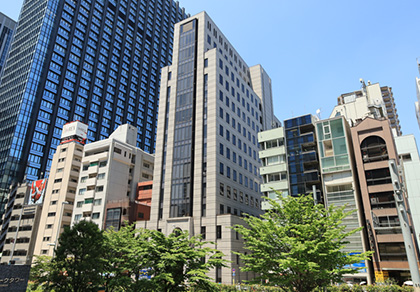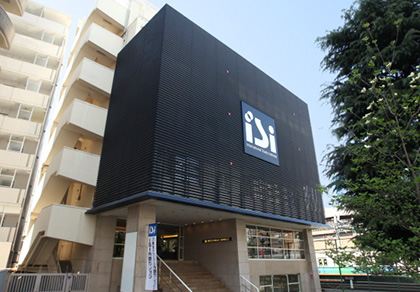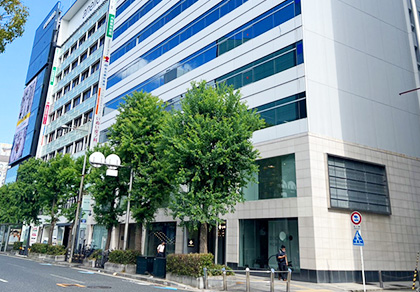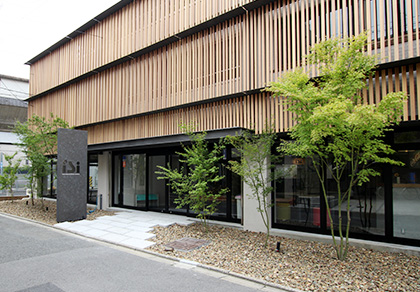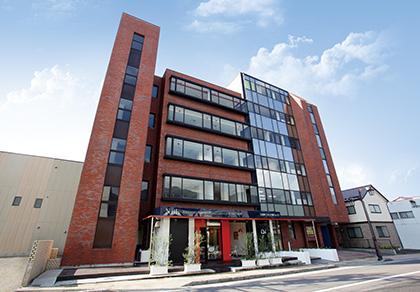Academic/General Japanese Course
- Home
- Course Introduction
- Academic/General Japanese Course
Features of the Academic/General Japanese Course
1. Enrollment is open 4 times a year
The enrollment period varies depending on the school.
The enrollment periods at the Shinjuku, Ikebukuro, and Kyoto campuses are four times a year, in April, July, October, and January; at the Osaka campus, three times a year, in April, July, and October; and at the Nagano campus, two times a year, in April and October.
2. The Academic Year begins in April
In accordance with the standard schedule of the Japanese education system, our school year generally begins in April. From April to March of the Following year comprises a school year. The following second year subsequently begins the next April to the next March.
3. Class teacher system
There is a homeroom teacher for each class, so students can always consult with them in regards to problems related to learning and school life. Each school has a special area for consultation, so you can feel security in your personal conversations.
4. Full career support
If you enroll from the beginner level, your personal teacher will provide an individual interview in October of the first year (intermediate and above levels may begin immediately). Following this, you can receive regular career guidance meetings every three months. In addition to regular interviews, you can also apply for interviews with your teacher at any time you feel it necessary. Each campus also has a career advisor who specializes in career guidance. In cooperation with your teachers, we will do our utmost to support students who hope to go on to higher education as well as those who wish to work.
>> Learn more about our pathway guidance services.
5. Elective classes to meet your needs
Beginning at the Intermediate II level, elective classes will be offered twice a week (90 minutes per class). Students can choose classes from the following options: Graduate School Preparation, EJU Exam Preparation (University/Vocational School Preparation), JLPT Exam Preparation, Conversation, and Job Hunting, according to their future plans and study objectives after graduation. Students can learn more practical content to meet their needs.
>>Learn more about elective classes
6. The “Top University Preparation Class” speciailizing in preparing students for entering top level Universities in Japan. (Shinjuku Campus ・ Kyoto Campus)
Our Shinjuku and Kyoto schools offer special classes for those aiming to entering top level universities and graduate schools in Japan. Upon completion of the Beginner I level, students can take a selection test to enter the Advanced Class, and those students who pass the test will be placed in the Advanced Class.
>>Learn more about Advanced Classes
7. Meaningful Activities
As part of off-campus learning and as an opportunity for international exchange, each school at the ISI Group conducts various events. Please see the school event on the following page.
>> See School Events
Implementing Schools
Length of Study and Class Levels
Classes are divided into 8 levels from beginner to advanced. The guidelines for learning objectives at each level are as follows.
| Level | JLPT Level Standards | CEFR Level Standards | Class hours per week | |
| Beginner | LevelⅠ | N5 | A1 | 200 classes in 10 weeks for each level |
| LevelⅡ | N4 | A2 | ||
| Intermediate | LevelⅠ | N3 | B1 | |
| LevelⅡ | N2 | |||
| LevelⅢ | B2 | |||
| Advanced | LevelⅠ | N2/N1 | ||
| LevelⅡ | N1 | |||
| LevelⅢ | C1 | |||
Elective Classes
Elective classes are offered to Intermediate II and above students according to their future paths and objectives. (Job Finding Class is for Intermediate III and above.) Elective classes are held twice a week (90 minutes per class). Students are asked to fill out a questionnaire at the beginning of each term to choose which elective class they would like to take. Please note that some classes may not be offered depending on the number of applicants.
| Implementing Schools | Graduate School Pathway Class | EJU Preparation Class | JLPT Preparation Class | Job Finding Class | Practical Conversation Class |
| Shinjuku Campus | ● | ● | ● | ● | ● |
| Ikebukuro Campus | ● | ● | ● | ● | |
| Osaka Campus | ● | ● | ● | ● | ● |
| Kyoto Campus | ● | ● | ● | ● | ● |
| Nagano Campus | ● | ● | ● |
![]()
Graduate School Pathway Class
Prepares students in writing research proposals and short theses that are required when applying to graduate schools in Japan.
![]()
EJU Preparation Class
Prepares students in using academic Japanese and studying for the EJU (Examination for Japanese University Admission for International Students) which is required when applying to universities in Japan. (*subject: Japanese)
![]()
JLPT Preparation Class
Focuses on problems that are likely to appear in the JLPT (Japanese Language Proficiency Test) or problems that have been previously used on the JLPT. Practice tests are administered before the actual JLPT.
![]()
Job Finding Class
The course prepares students for job hunting through practical learning such as "Resume writing", "Interview practice", and "Presentation skill improvement".
![]()
Practical Conversation Class
Seeks to improve conversation skills through activities such as role-play, debate and field work.
Top University Preparation Class (Shinjuku Campus ・ Kyoto Campus)
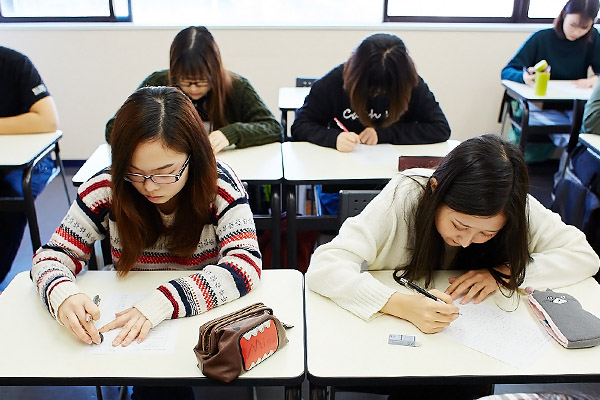
Classes for students who wish to enter top universities and graduate schools in Japan
The Top University Preparation Class at our Shinjuku and Kyoto schools are arranged for students aiming to enter top level universities and graduate schools in Japan.
Students who wish to join the class may take a selection exam held periodically, and those who pass the exam may join the special class.
The curriculum is faster than the regular curriculum, and includes JLPT and EJU preparation (subject: Japanese), as well as preparation for university and graduate school entrance exams (essay, statement of purpose, research plan, original exams for each university, interviews, etc.), and many students enter difficult-to-enter universities and graduate schools every year.
School Timetable・Number of Students in Each Class
- Classes are scheduled every Monday to Friday. There are no classes on national and school holidays.
- There are 2 class periods each school day. 1 class period lasts 90 minutes.
- You will have class in the morning or afternoon, depending on which class you are enrolled in.
- There are up to 20 students in each class.
【Morning Classes】
- 1st period : 8:50~10:20
- 2nd period : 10:30~12:00
【Afternoon Classes】
- 1st period : 13:00~14:30
- 2nd period : 14:40~16:10
Class Placement Test
ISI uses an online Class Placement Test which can be accessed through a computer or smart phone. As a result, you can immediately check your assigned class on arrival in Japan and smoothly transition to the beginning of your school life. We will also ask you to complete a questionnaire about your past experiences in learning Japanese and your future plans, which will then be used to place you in a class that matches with your level of Japanese and learning goals. In case you feel that the assigned class does not match with your level of Japanese, we have a Class Changing Period in place, during which you can consult with faculty to change classes.
Academic Performance and Evaluation
Students who remain enrolled until the end of the semester will be graded.
Grades will be determined from the results of textbook attributes, quizzes, homework assignments, and the final exam at the end of each semester.
Competency assessment will be done in the form of “on paper”, “online”, “oral examinations”, etc. according to the characteristics of each subject.
There are eight fields of study (Listening Comprehension, Reading Comprehension, Conversation, Writing, Grammar, Vocabulary, Pronunciation, and Assignments) and an overall evaluation, based on the aforementioned evaluation. A+ (90-100 points), A (80-89 points), B (70-79 points), C (60-69 points), and D (59 points or less). Students can check their semester grades on the student portal site (Campusmate-J).
Advancement is determined by a grade evaluation conducted at the end of each semester.
Students who achieve an overall grade of C or higher are eligible to advance to a higher level. In the case of a D grade, the student will be given an assignment by the school. The results of the assignment and the school’s teaching committee will determine whether or not the student will be allowed to advance to the next level. If the student is not promoted, he/she will repeat the same course of study.
Graduation Requirements
If all of the following criteria are met, graduation will be granted in March of the second academic year. Upon graduation, students will receive a ” Graduation Diploma”.
- Attendance rate of at least 80% by the end of February of the graduation year.
- Must be able to confirm that the applicant has passed a Japanese language examination equivalent to CEFR A2 or higher*, which is recognized by the Ministry of Justice, in Japan during the period of enrollment in the program.
* CEFR A2 equivalent or higher: JLPT N4, J-TEST Level E, EJU 200 points, TOP-J Elementary A-4, NAT Level 4, J-cert Japanese for Daily Living and Occupational Japanese Proficiency Test (J-Cert) Semi-Intermediate, STBJ Standard Test of Business Japanese BJ4, JLCT JCT3 or higher - An overall grade of “C” or better on the December final exam of the year of graduation.
Students who do not fulfill the above requirements but hold a student visa.
- If the above criteria for graduation are not met, a “Certificate of Completion” will be awarded.

